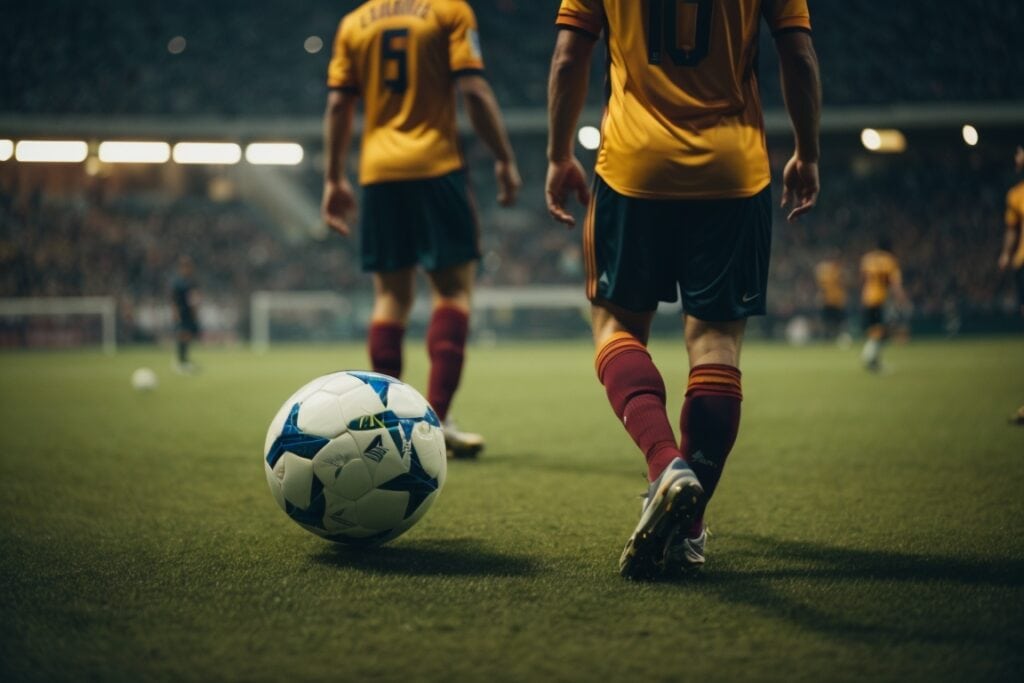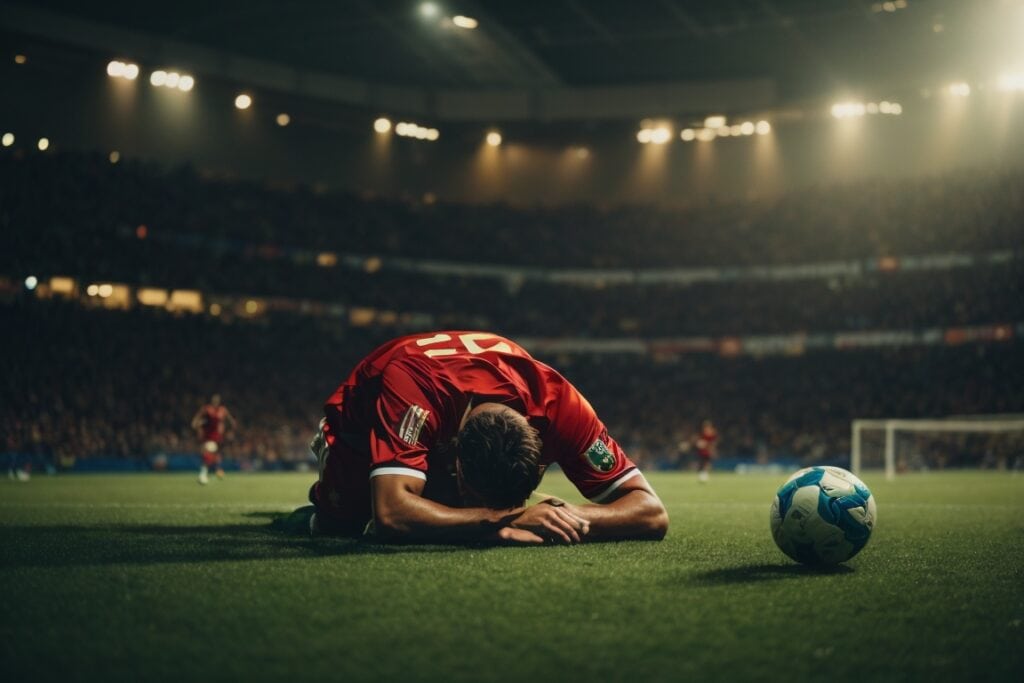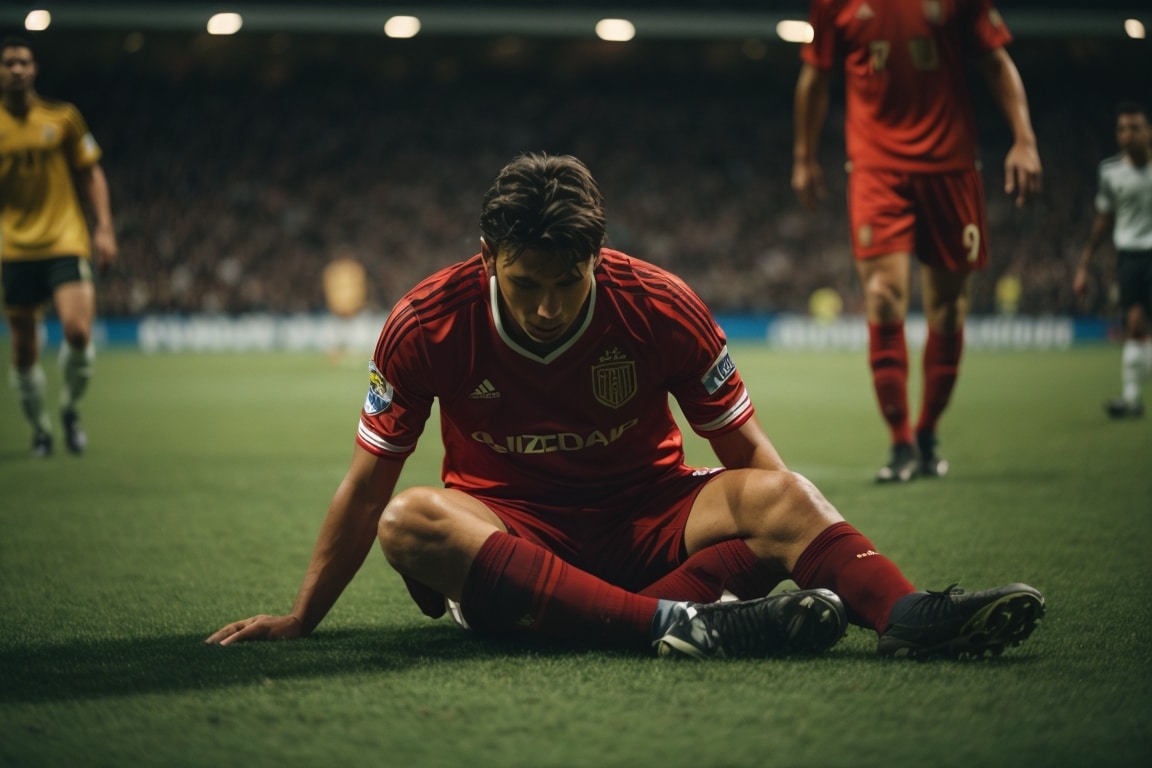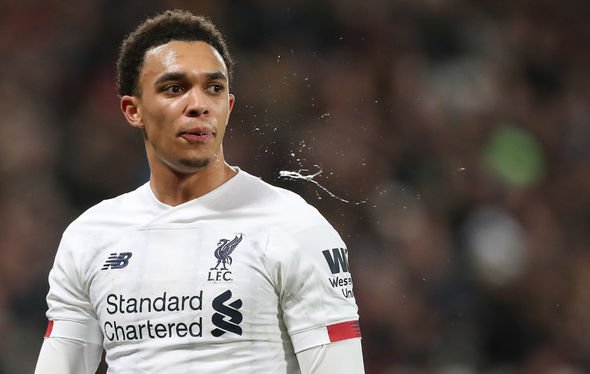In the realm of soccer, one might argue that no sight is more exasperating than that of a player dramatically collapsing to the ground, clutching a body part in apparent agony, only to miraculously recover moments later. Referred to as “flopping,” this controversial behavior has become increasingly common in the sport, prompting heated debates among fans, players, and officials alike. Understanding the reasons behind this phenomenon requires delving into the intricacies of the game, human psychology, and the impact it has on various aspects of soccer. Let us explore why soccer players flop so much and the multifaceted nature of this intriguing issue.
Understanding the Concept of Flopping in Soccer

Flopping is an act in soccer where players deliberately exaggerate the impact of a collision or foul to deceive the referee into making a favorable decision, such as awarding a free-kick or penalty. This tactic is employed to gain an unfair advantage over opponents and manipulate the outcome of the game. A ubiquitous term in soccer circles, flopping, also known as diving or simulation, has stirred up intense controversy due to its potential to alter the course of matches, tarnish players’ reputations, and even influence the game’s overall entertainment value.
Definition of Flopping
To fully comprehend the issue at hand, it is essential to establish what constitutes flopping in the context of soccer. Flopping occurs when a player intentionally exaggerates the force or impact of contact or pretends to be injured when, in reality, little or no contact has occurred. By deceiving the referee, these actors seek to gain favorable decisions or provoke penalties, disrupting the flow of the game and compromising its integrity.
History and Origin of Flopping
Flopping is not a recent development. Its roots can be traced back to the early years of soccer, albeit in different forms. Throughout history, players have sought strategic advantages by resorting to various forms of gamesmanship. However, in recent decades, flopping has become more prevalent, perhaps due to a convergence of factors, including increased media scrutiny, a higher incidence of diving incidents involving high-profile players, and the influence of globalization on the game. As a result, this controversial tactic has found its way into the mainstream soccer culture.
One of the earliest instances of flopping can be traced back to the 1960s when Italian soccer player Gianni Rivera was accused of diving during a crucial match. This incident sparked a heated debate about the ethics of such behavior and its impact on the integrity of the game. Since then, the practice of flopping has evolved and become more sophisticated, with players developing new techniques to deceive officials.
In the modern era, the rise of television and digital media has brought increased attention to flopping. With multiple camera angles and slow-motion replays, it has become easier to scrutinize players’ actions and determine whether they are genuinely injured or simply play-acting. This heightened scrutiny has led to both praise for players who stay on their feet and criticism for those who engage in deceptive behavior.
Furthermore, the globalization of soccer has played a significant role in the spread of flopping. As the sport has become more popular worldwide, players from different cultures and backgrounds have brought their own unique styles and tactics to the game. Some argue that certain regions or countries have a higher tolerance for flopping, leading to a normalization of the behavior in those areas.
The impact of flopping goes beyond the immediate outcome of a game. It can have long-lasting effects on players’ reputations and the overall perception of the sport. Fans and pundits often discuss and debate instances of flopping, questioning the integrity of players and the fairness of the game. This controversy adds an extra layer of drama and intrigue to soccer, but it also raises important questions about sportsmanship and fair play.
In conclusion, flopping is a tactic in soccer where players intentionally exaggerate the impact of a collision or foul to deceive the referee. It has a long history in the sport, but its prevalence has increased in recent decades. Flopping is a controversial practice that can alter the course of matches, tarnish players’ reputations, and influence the overall entertainment value of the game. As soccer continues to evolve, the issue of flopping remains a hot topic of discussion among fans, players, and officials.
The Psychology Behind Flopping

Examining the psychology that drives players to engage in flopping brings insight into the complex motivations behind this behavior. Various psychological factors contribute to the prevalence of flopping, including pressure and expectations, the desire to manipulate referee decisions, and the influence of team goals.
When it comes to pressure and expectations, the world of professional soccer is a high-stakes environment. Players face immense pressure to win matches and secure victories for their teams. The weight of expectations from fans, coaches, and even their own teammates can be overwhelming. Flopping becomes a weapon to alleviate this pressure by creating opportunities to change the course of the game, thereby shifting the outcome in their favor. In the heat of the moment, the potential rewards of a successful flop often outweigh the risks of being caught.
Furthermore, the act of flopping is often driven by the desire to manipulate referee decisions. Referees hold a significant amount of power during soccer matches. With split-second decisions to make, they rely on players’ actions and reactions to determine the legitimacy of fouls and penalties. Players who flop skilfully can exploit this reliance on visual cues to influence referees into making erroneous decisions. This manipulation of the rules alters the dynamics of the game, further complicating the already challenging task referees face in maintaining fairness and upholding the game’s integrity.
Additionally, the influence of team goals cannot be overlooked. While individual players may engage in flopping to gain an advantage, the team’s objectives also play a role. Teams often strategize to gain any possible advantage over their opponents, and flopping has become a tactic employed by some teams to gain an upper hand. This collective approach to flopping can create a culture within a team that encourages such behavior, further perpetuating its prevalence in the sport.
In conclusion, the psychology behind flopping in soccer is a multi-faceted phenomenon. Pressure and expectations, the desire to manipulate referee decisions, and the influence of team goals all contribute to the prevalence of flopping. Understanding these psychological factors can shed light on the complex motivations behind this behavior and help in developing strategies to discourage and penalize flopping in the sport.
The Impact of Flopping on the Game

The prevalence of flopping alters the fabric of soccer in significant ways. From affecting the outcome of individual matches to shaping players’ reputations, the impact of this behavior extends far beyond the pitch.
But what exactly is flopping? Flopping, also known as diving, is a tactic used by soccer players to deceive the referee into believing they have been fouled. It involves exaggerating contact or simulating injury in order to gain an advantage for their team. While some argue that it is a strategic move to draw fouls and penalties, others view it as a form of cheating that undermines the integrity of the game.
Influence on Match Outcomes
Flopping has the potential to influence the outcome of a match, thus distorting fair competition. A well-executed flop can result in an unjustifiably awarded free-kick, penalty, or even the expulsion of an opposing player. These pivotal moments can shift momentum and create scoring opportunities, drastically affecting the final result.
Consider a scenario where a player dives in the penalty box, convincing the referee to award a penalty kick. This decision not only grants the diving player’s team an opportunity to score, but it also puts the opposing team at a disadvantage. The unfairly penalized team may feel frustrated and demoralized, leading to a loss of focus and ultimately affecting their performance.
Furthermore, flopping can disrupt the flow of the game. Players who frequently dive disrupt the natural rhythm of play, causing unnecessary stoppages and breaks. This not only frustrates fans but also hampers the overall viewing experience.
Effect on Player Reputation
Players who consistently resort to flopping may find their reputations tarnished. The soccer community holds players to high standards, expecting sportsmanship, fair play, and respect for the game’s traditions. Flopping contradicts these values and may lead to harsh criticism from peers, fans, and media alike.
Take, for example, a player who is notorious for diving. Their actions become a focal point of discussion, with pundits and commentators questioning their integrity and commitment to fair play. This negative attention not only affects their professional standing but also their personal image.
Additionally, repeat offenders risk being seen as manipulative and untrustworthy, potentially hampering their future prospects in the sport. Coaches and team managers may hesitate to sign or select players known for their diving antics, fearing the negative impact it could have on team dynamics and public perception.
In conclusion, the impact of flopping on the game of soccer goes beyond mere tactics or gamesmanship. It has the potential to influence match outcomes, distort fair competition, and tarnish players’ reputations. As the sport continues to evolve, it is crucial to address this issue and find ways to maintain the integrity and authenticity of the beautiful game.
The Rules and Regulations Around Flopping

FIFA, the international governing body for soccer, has long recognized the need to address the issue of flopping. The organization has implemented various measures aimed at discouraging and penalizing this behavior, albeit with mixed success.
FIFA’s Stance on Flopping
FIFA explicitly prohibits players from engaging in unsportsmanlike behavior, including flopping. The organization actively promotes fair play and has introduced disciplinary measures to combat this issue. However, FIFA’s ability to eradicate flopping entirely remains a challenge due to the subjectivity of decision-making and the difficulty of identifying intent in real-time. Regardless, FIFA’s stance sends a clear message that flopping is not condoned, even if eradicating it entirely proves to be a formidable task.
One of the reasons FIFA takes a strong stance against flopping is to maintain the integrity of the game. Flopping not only deceives the referees but also undermines the spirit of fair competition. It can lead to unfair advantages for the flopping player’s team and disrupt the flow of the game. By penalizing flopping, FIFA aims to ensure that players rely on their skills and athleticism rather than resorting to deceptive tactics.
Additionally, flopping can have a negative impact on the image of the sport. Fans and spectators expect to witness genuine displays of athleticism and sportsmanship. When players flop, it can create a sense of frustration and disappointment among the audience, tarnishing the reputation of the game. FIFA recognizes the importance of upholding the sport’s reputation and aims to maintain its integrity by discouraging flopping.
Consequences for Excessive Flopping
FIFA’s regulations include the provision to punish players found guilty of excessive flopping. Offenders can face disciplinary actions such as yellow cards, post-match suspensions, or fines. While these consequences are intended to deter players from resorting to flopping, effective enforcement remains key to reducing its prevalence in professional soccer.
Yellow cards serve as a warning to players who engage in flopping. If a player receives multiple yellow cards for flopping throughout a season, they may face more severe penalties, such as a suspension. This escalation of punishment aims to discourage repeat offenders and protect the integrity of the game.
In some cases, FIFA may also impose fines on players who are found guilty of excessive flopping. These fines act as a financial deterrent, making players think twice before engaging in deceptive behavior. The monetary consequences can be significant, especially for high-profile players who earn substantial salaries.
While FIFA’s disciplinary measures are in place, the effectiveness of enforcement remains a challenge. Referees play a crucial role in identifying and penalizing flopping during matches. However, the real-time nature of the game and the speed at which actions occur make it difficult for referees to make accurate judgments in every instance. FIFA continues to invest in technology and training programs to improve referee decision-making and increase the consistency of enforcement.
Moreover, FIFA recognizes the importance of educating players about the negative consequences of flopping. Through awareness campaigns and training initiatives, FIFA aims to instill a sense of fair play and sportsmanship among players. By promoting a culture of integrity and respect, FIFA hopes to reduce the prevalence of flopping in soccer.
Famous Instances of Flopping in Soccer History

Over the years, several notable incidents of flopping have caught the public’s attention. From repeat offenders to game-changing dives in major tournaments, these instances serve as reminders of the ongoing battle against flopping within the sport.
Notorious Floppers in Professional Soccer
Several players have gained notoriety for their consistent use of flopping. These individuals have mastered the art of deception, often deploying their acting skills with precision to gain an unfair advantage. Their actions not only tarnish their own legacies but also perpetuate the negative perception of flopping in soccer.
Game-Changing Flops in Major Tournaments
Throughout the history of major soccer tournaments, spectators have witnessed instances where flopping has altered the course of games. These pivotal moments have the potential to change the outcome of an entire tournament, leaving a lasting imprint on the sport’s history. Moments like these highlight the need for continued vigilance in eradicating flopping and ensuring that the game remains true to its essence.
In conclusion, flopping has become an inherent part of modern soccer, much to the dismay of fans, players, and officials alike. Understanding the reasons behind this pervasive behavior requires an examination of the complex interplay between game dynamics, psychological pressures, and the impact it has on soccer as a whole. While efforts have been made to combat flopping, it remains an ongoing battle that warrants continuous attention. Ultimately, addressing this issue would contribute to preserving the integrity of the beautiful game and ensure fair and authentic competition for players, fans, and stakeholders alike.







